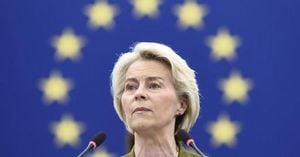Turmoil erupted at the Centers for Disease Control and Prevention (CDC) this week as sweeping leadership changes and policy disputes sent shockwaves through the nation’s top public health agency. The White House’s decision to fire CDC Director Susan Monarez, less than a month after she took office, set off a chain reaction: three top officials resigned in protest, and hundreds of CDC employees staged a dramatic walkout at the agency’s Atlanta headquarters on August 28, 2025.
The roots of the crisis trace back to August 27, when Secretary of Health Robert F. Kennedy Jr. sought Monarez’s ouster, according to The Bulletin and The New York Post. Monarez, a career federal scientist with two decades of government service and the first CDC director to require Senate confirmation, had reportedly clashed with Kennedy over vaccine policy and personnel decisions. When asked to resign, Monarez refused. Her lawyers argued that only the president could fire her, not the Secretary of Health. Nevertheless, the White House moved swiftly to remove her, with Press Secretary Karoline Leavitt announcing, “What I will say about this individual is that her lawyer’s statement made it abundantly clear themselves that she was not aligned with the president’s mission to make America healthy again.”
President Donald Trump, who appointed Kennedy as Secretary of Health, had not publicly weighed in on the dispute by late Thursday. But the administration wasted no time in finding a replacement: Deputy Health and Human Services Secretary Jim O’Neill, a Silicon Valley investor and former CEO of the Thiel Foundation, was tapped as acting CDC director. O’Neill, who previously held posts at the Department of Health and Human Services (HHS) and the Food and Drug Administration during the George W. Bush administration, is known for his association with billionaire Trump donor Peter Thiel and for co-founding the Thiel Fellowship.
Monarez’s firing and the subsequent resignations of three senior CDC officials—former chief medical officer Debra Houry, former director of the National Center for Immunization and Respiratory Diseases Demetre Daskalakis, and former director of the National Center for Emerging and Zoonotic Infectious Diseases Daniel Jernigan—triggered a wave of anger and anxiety within the agency. Hundreds of CDC employees walked out of the Atlanta headquarters, lining the sidewalks to cheer and salute the departing leaders. “We planned to let the folks walk out of CDC and clap them out, but they were escorted out of CDC this morning, which is not cool,” one protest organizer told The New York Post.
The resignations were not quiet affairs. Daskalakis, who previously served as the Biden administration’s national monkeypox response coordinator, cited a litany of concerns in his resignation letter: “Change in the COVID-19 recommendations for children and pregnant people, the firing of scientists from [a vaccine advisory panel] by X post and an op-ed rather than direct communication with these valuable experts, the announcement of new [vaccine advisory panel] members by X before onboarding and vetting have completed.” He added, “My grandfather, who I am named after, stood up to fascist forces in Greece and lost his life doing so. I am resigning to make him and his legacy proud.”
Debra Houry, speaking at the walkout, voiced alarm about the direction of public health policy under Kennedy and the Trump administration. She specifically pointed to looming changes at the Advisory Committee on Immunization Practices (ACIP), a panel whose recommendations shape vaccine schedules for schools, insurance coverage, and a federal program for low-income children. “ACIP coming up is really one of the things that tipped us all,” Houry said, as reported by The Bulletin. “We are concerned about upcoming recommendations that probably have been made before we have the data and the science; we always follow the data and the science before we make recommendations.”
Much of the internal dissent centers on Kennedy’s approach to vaccines. A longtime critic of vaccination mandates, Kennedy has drawn criticism for firing members of the CDC’s vaccine advisory group and replacing some with prominent vaccine skeptics, including a board member of a leading anti-vaccine advocacy organization. He has also been accused of undercutting confidence in established vaccines, offering only tepid praise for the measles vaccine during a recent outbreak and cutting funding from mRNA vaccine research. Public health experts warn that these moves threaten to erode public trust in vaccines and weaken the nation’s ability to respond to both new and resurgent diseases.
Monarez’s lawyers have been outspoken in defending her record and motives, telling The New York Post that the administration targeted her because she “refused to rubber-stamp unscientific, reckless directives and fire dedicated health experts.” The CDC and HHS, for their part, have declined to comment on the unfolding crisis.
The political fallout has extended beyond the CDC. Republican Senators Bill Cassidy of Louisiana and Susan Collins of Maine—both of whom played key roles in Kennedy’s confirmation—have voiced deep concern about the leadership shake-up and the integrity of the vaccine advisory process. Cassidy, a physician, called for the September ACIP meeting to be postponed, citing “serious allegations… about the meeting agenda, membership, and lack of scientific process being followed for the now announced September ACIP meeting.” He warned, “These decisions directly impact children’s health, and the meeting should not occur until significant oversight has been conducted. If the meeting proceeds, any recommendations made should be rejected as lacking legitimacy given the seriousness of the allegations and the current turmoil in CDC leadership.”
Collins, meanwhile, said, “While I recognize that the CDC Director serves at the pleasure of the President, I am alarmed that she has been fired after only three weeks on the job,” according to the Maine Morning Star. Both senators have demanded more transparency and oversight, reflecting a growing bipartisan unease with the politicization of public health agencies.
The mass resignation of Houry, Jernigan, and Daskalakis was meant as a wake-up call, Houry explained: “If one of us retired, it would have been a blip. When the three of do it together it’s more powerful, and it just shows the state of our agency.” She called on Congress to intervene and restore scientific integrity to the CDC’s decision-making process.
As the CDC faces an uncertain future, the stakes could hardly be higher. With key vaccine recommendations hanging in the balance and morale at a historic low, the agency’s ability to protect public health is under intense scrutiny. The coming weeks—especially the September ACIP meeting—will test whether the CDC can regain its footing and the public’s trust amid unprecedented political and scientific upheaval.




